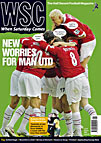 Jon Spurling wonders whether applause is an appropriate replacement for the minutes silence.
Jon Spurling wonders whether applause is an appropriate replacement for the minutes silence.
Just as views on the responsibility for George Best’s early death are polarised, the same is true of attitudes towards the minute’s applause that was seen at Portsmouth and West Ham to mark his passing. There is a weighty body of evidence that suggests that Best would have approved of such a gesture. On Parkinson last year, he confessed: “I hope I’m remembered for the football and the cheers I brought to grounds, rather than all the front-page nonsense.” A lesser known fact is that he preferred the B-side of Don Fardon’s Belfast Boy – Echoes Of The Cheers – to the song that reached number 32 in the charts and which due to its ubiquitousness over the Old Trafford PA system was an early-Seventies version of Simply The Best.
Seventy years ago, after Arsenal manager Herbert Chapman died, the Islington Gazette reported that an Arsenal fan had been ejected from Highbury after launching into a rendition of For He’s A Jolly Good Fellow during a period of silent reflection. Although the circumstances were different, given the instruction in the programme for the match against Sheffield Wednesday that the crowd should “remain absolutely quiet”, the Gazette’s follow-up comment is revealing: “The death of a significant figure in one’s life is not a case for rejoicing of any sort – rather a time of mournful reflection.” Times have changed. The decision to celebrate Best’s sporting achievement at Fratton and Upton Parks, rather than silently reflect on his passing, is further evidence of Britain’s increasingly secular attitude towards such matters. The religious and moral absolutes of the Victorian response to death – a fixed period of mourning, quiet reflection and all-black garb – seem to be disappearing.
Despite almost universal media approval of the applause, not all fans were comfortable with it. “Silence requires effort and conveys respect,” argued one Talk Sport caller. “What happened today was not an appropriate gesture. Death is always a sad occasion and shouldn’t be marked with celebration.” Modernists point out that a period of silence – introduced after the 1918 armistice to reflect the fact that the gunfire had finally ceased – is a comparatively modern development. But Birmingham chairman David Gold’s suggestion that all future memorials be met with a similar reaction (“The great thing about fans applauding is that it not only celebrates life, but it drowns out fans who want to ruin the atmosphere of respect”) has already been criticised by some. “It’s designed to cater for the lowest common denominator,” said an irate Five Live listener, who had earlier referred to “some moronic Leeds fans desecrating the memory of Best this weekend and Matt Busby back in 1994”.
Fans attending the England v Moldova match at Wembley in September 1997 were invited to light a candle in memory of Princess Diana during a “period of reflection”. Ian Wright dedicated his goal to the memory of “my queen of hearts”. Since her death, the number of minute’s silences at matches has grown, leading to allegations that the whole experience has become somehow cheapened. “Her death,” argues media analyst Steve Hart, “made it almost trendy for British people to mourn and show their emotions. Football authorities also seem overly keen to show the sport has a soul and have cottoned on to the fact that such gestures show football in a positive light.”
Group huddles, teams emerging from the tunnel together and lining up to shake hands before kick-off: all contribute to the increasingly sanitised atmosphere inside grounds and are designed to show that a community spirit exists within a sport that is frequently castigated for its greed and selfishness. The new “period of celebration” is an extension of this. Amid the cheering and clapping, let’s hope that many fans’ genuine sadness at the passing of some of the game’s leading stars is not forgotten.
From WSC 227 January 2006. What was happening this month